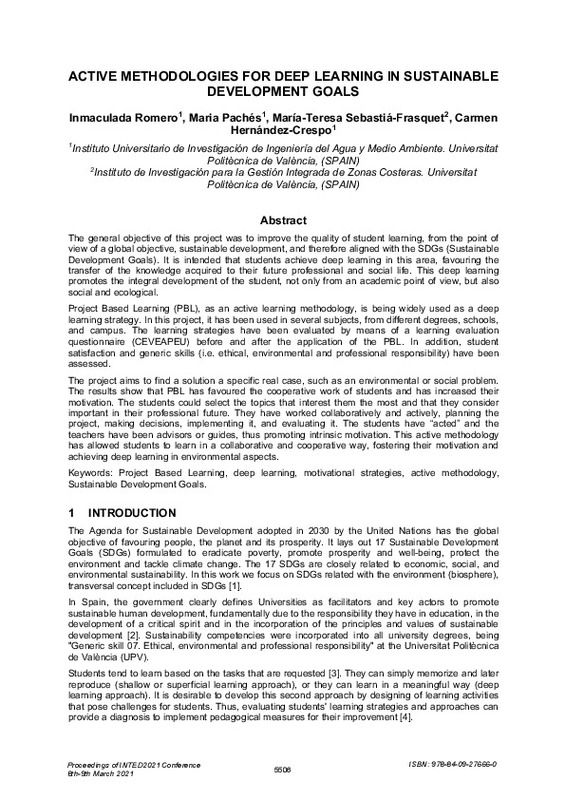JavaScript is disabled for your browser. Some features of this site may not work without it.
Buscar en RiuNet
Listar
Mi cuenta
Estadísticas
Ayuda RiuNet
Admin. UPV
Active methodologies for deep learning in sustainable development goals
Mostrar el registro sencillo del ítem
Ficheros en el ítem
| dc.contributor.author | Romero Gil, Inmaculada
|
es_ES |
| dc.contributor.author | Paches Giner, Maria Aguas Vivas
|
es_ES |
| dc.contributor.author | Sebastiá-Frasquet, M.-T.
|
es_ES |
| dc.contributor.author | Hernández Crespo, Carmen
|
es_ES |
| dc.date.accessioned | 2021-11-19T10:56:23Z | |
| dc.date.available | 2021-11-19T10:56:23Z | |
| dc.date.issued | 2021-03-09 | es_ES |
| dc.identifier.isbn | 978-84-09-27666-0 | es_ES |
| dc.identifier.issn | 2340-1079 | es_ES |
| dc.identifier.uri | http://hdl.handle.net/10251/177292 | |
| dc.description.abstract | [EN] The general objective of this project was to improve the quality of student learning, from the point of view of a global objective, sustainable development, and therefore aligned with the SDGs (Sustainable Development Goals). It is intended that students achieve deep learning in this area, favouring the transfer of the knowledge acquired to their future professional and social life. This deep learning promotes the integral development of the student, not only from an academic point of view, but also social and ecological. Project Based Learning (PBL), as an active learning methodology, is being widely used as a deep learning strategy. In this project, it has been used in several subjects, from different degrees, schools, and campus. The learning strategies have been evaluated by means of a learning evaluation questionnaire (CEVEAPEU) before and after the application of the PBL. In addition, student satisfaction and generic skills (i.e. ethical, environmental and professional responsibility) have been assessed. The project aims to find a solution a specific real case, such as an environmental or social problem. The results show that PBL has favoured the cooperative work of students and has increased their motivation. The students could select the topics that interest them the most and that they consider important in their professional future. They have worked collaboratively and actively, planning the project, making decisions, implementing it, and evaluating it. The students have ¿acted¿ and the teachers have been advisors or guides, thus promoting intrinsic motivation. This active methodology has allowed students to learn in a collaborative and cooperative way, fostering their motivation and achieving deep learning in environmental aspects. | es_ES |
| dc.description.sponsorship | The project of innovation and educational improvement in which this communication is framed has received financial support from the Institute of Education Sciences (ICE) of the Universitat Politècnica de València (UPV) Proyecto de Innovación y Mejora Educativa (PIME/19-20/174 ), Objetivo Agenda 2030 y UPV 2020: Aprendizaje ambiental profundo en la UPV. | es_ES |
| dc.language | Inglés | es_ES |
| dc.publisher | IATED Academy | es_ES |
| dc.relation.ispartof | INTED2021 Proceedings | es_ES |
| dc.rights | Reserva de todos los derechos | es_ES |
| dc.subject | Project Based Learning | es_ES |
| dc.subject | Deep learning | es_ES |
| dc.subject | Motivational strategies | es_ES |
| dc.subject | Active methodology | es_ES |
| dc.subject | Sustainable Development Goals | es_ES |
| dc.subject.classification | TECNOLOGIA DEL MEDIO AMBIENTE | es_ES |
| dc.title | Active methodologies for deep learning in sustainable development goals | es_ES |
| dc.type | Comunicación en congreso | es_ES |
| dc.type | Artículo | es_ES |
| dc.type | Capítulo de libro | es_ES |
| dc.identifier.doi | 10.21125/inted.2021.1115 | es_ES |
| dc.relation.projectID | info:eu-repo/grantAgreement/UPV//PIME%2F19-20%2F174/ | es_ES |
| dc.relation.projectID | info:eu-repo/grantAgreement/UPV//PIME B24//Proyectos de Innovación y Mejora Educativa (PIME)/ | es_ES |
| dc.rights.accessRights | Abierto | es_ES |
| dc.contributor.affiliation | Universitat Politècnica de València. Departamento de Ingeniería Hidráulica y Medio Ambiente - Departament d'Enginyeria Hidràulica i Medi Ambient | es_ES |
| dc.description.bibliographicCitation | Romero Gil, I.; Paches Giner, MAV.; Sebastiá-Frasquet, M.; Hernández Crespo, C. (2021). Active methodologies for deep learning in sustainable development goals. IATED Academy. 5506-5513. https://doi.org/10.21125/inted.2021.1115 | es_ES |
| dc.description.accrualMethod | S | es_ES |
| dc.relation.conferencename | 15th International Technology, Education and Development Conference (INTED2021) | es_ES |
| dc.relation.conferencedate | Marzo 08-09,2021 | es_ES |
| dc.relation.conferenceplace | Online | es_ES |
| dc.relation.publisherversion | https://doi.org/10.21125/inted.2021.1115 | es_ES |
| dc.description.upvformatpinicio | 5506 | es_ES |
| dc.description.upvformatpfin | 5513 | es_ES |
| dc.type.version | info:eu-repo/semantics/publishedVersion | es_ES |
| dc.relation.pasarela | S\430801 | es_ES |
| dc.contributor.funder | Universitat Politècnica de València | es_ES |








